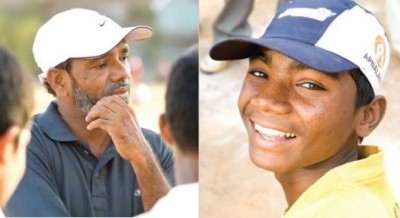by Vani Viswanathan
While working on my M.A. thesis, I spoke with college students from lower and upper middle class backgrounds in Chennai and Coimbatore about their perceptions on sexual harassment. Most students – male and female – felt that in some way or the other, women did things that attracted sexual harassment. One of the (male) participants went as far as saying “Believe me, a woman can’t be harassed without her consent.”
And consider the comments made by one of the rapists convicted for the 6 Dec 2012 gang-rape in the controversial documentary “India’s Daughter”: “A girl is far more responsible for rape than a boy. Boy and girl are not equal. Housework and housekeeping is for girls, not roaming in discos and bars at night doing wrong things, wearing wrong clothes.”
Clearly, this shows that there’s not been enough attention paid to an important piece of the puzzle in addressing gender-based violence (GBV): the role of men. After all, as one of my thesis interviewees, and the Nirbahaya rapist said, it does “take two hands to clap,” doesn’t it?
World over, organizations have begun to involve men in the fight against GBV to ensure that perpetration of violence (as far as it begins from men) is addressed. International Center for Research on Women (ICRW) is one such organization that through its programme “Parivartan” (change) in India, worked with men to help them reflect on their role in perpetrating violence against women, and talk about it to adolescent boys they were close to.
I met Madhumita Das, senior technical specialist with ICRW, who has been associated with Parivartan since its inception. She gave me a good two hours of her time to discuss the wonderful project.
Why men, and which men?
“In the last two decades many initiatives have tried to empower women and redress gender inequality but what we have realized that improving the health and well-being of women and ensuring that women can exercise their rights generally requires engaging men. …” said Das.
Most GBV is derived from convoluted notions of “masculinity”, as men are often encouraged to act in certain ways towards women – often controlling and violent – to “be a man”. Not doing so could result in a man being called sissy or deemed a failure. Therefore, any effort to address men’s role in GBV would definitely have to address conventional ideas of masculinity.
Indeed, this was one of the key objectives of Parivartan. Adolescent boys became a natural audience for the programme, given that boys start forming their opinions about what it means to “be a man” and the role of women in society at a very early age.
The next question, then, was who these boys would listen to. Das said that while fathers sound like a definite option, they come with the tag of being someone the boys “had to” listen to; also, adolescent boys would be unlikely to choose to discuss matters of sexuality or relationships with fathers.
Following the model of Changing Boys into Men, a programme by Futures without Violence in the US, Parivartan decided to engage with sports coaches to reach the boys with messages on gender-based violence. “The coach has a good relationship with the boys because he comes from a different background; he doesn’t come with the baggage of the father but is still close to them (boys), and there are additional aspects they can share,” said Das.
So coaches it was, and cricket was the obvious choice. ICRW decided to experiment with boys and coaches in Mumbai in two different settings: one, in schools, where formalised cricket coaching takes place, and two, in slum communities. A long recruitment process followed, where 25 school coaches and 16 community-based mentors were selected.
Taking the reflective route
I was intrigued; how was ICRW confident that these coaches and mentors were free of gender biases themselves? Just how much of training could reverse years of ideas of masculinity and sexism?
Das said that’s where the long recruitment process helped. Only coaches or community members who demonstrated that they wanted to do more for “their boys” beyond just cricket, were chosen. “We had to look for people with passion and commitment to do something for their community and take it forward.”
Part of the process was also about accepting and addressing the coaches/mentors’ uncertainty that they were not “qualified” to talk about the subject when they too, at some point, had engaged in it themselves.
“Parivartan relied more on reflection than on teaching,” said Das, explaining how coaches/mentors were taught how to tell their personal stories – of using insulting language, for example – to not just tell the boys that they were one of them, but to also prove that change was possible. They were also trained on how to discuss with the boys concepts such as swear words (which nearly always have to do with female body parts or control!), aggression on the field, sexual harassment of women and ideas about respect. These ideas were seamlessly woven in during cricket practice sessions, rather than through separate sit-down-learn sessions.
Not surprisingly, several ideas dominant in the average Indian mindset came up: that Indians, by nature, are “respectful” – which led to discussions around what respect means. Many also felt that men have to “protect” women, to which the programme coordinators responded by saying that women are likely to seek support, rather than protection, in their fight against GBV.
Change, one step at a time
At the end of its one-and-a-half-year period, Parivartan could demonstrate attitude changes in how the coaches/mentors and the boys viewed gender, violence, masculinity and the role of girls in society and their lives, as reported by the participants themselves. However, attitudes about women’s dressing and their role outside the house were still debated; for example, many coaches/mentors felt that not all men “were good”, therefore it was better that women dressed “safe”.
The community mentors showed more promise than the school coaches, said Das. Being in the same locality as the boys, the mentors felt they had to always be mindful of their behaviour so they could be role models. Being young, the mentors also had to go back fewer years to re-evaluate their ideas of masculinity than the school coaches, who were older.
Most importantly, ICRW went to the women in the lives of the mentors – their wives, sisters, mothers – and asked them if, and how, things had changed. Surprisingly, and in a way that gives hope for the future, these women confided that they “could see a change” in the way the man behaved. “We heard everything from ‘He now thinks about me, respects me and my decisions’, to ‘He involves me in his life’ to ‘He now helps out with household chores’,” Das said, visibly happy at the outcomes of the project. Wives of coaches/mentors talked about lower levels of violence and aggression as well as increased emotional and sexual intimacy.
Of course, one has to remember that it takes a lot for attitude changes to lead to sustained behaviour change – which, Das agrees, will need a more sustained campaign where messages are constantly reinforced. But she cites examples of how the mentors have taken it upon themselves to continue the work they started with Parivartan: several of them work with local community-based organizations. ICRW is also experimenting with creating groups of fathers who come together to discuss issues of GBV and women’s rights to education and employment in interesting sessions where they watch movie scenes, play games and discuss politics. The cricket mentors help out in these sessions by discussing GBV.
Additionally, feedback provided by the mentors when they were coaching the boys led to the launch of another component of Parivartan: sports coaching of girls while making them aware of their rights and encouraging them to aspire higher, with some training about sexual health. Female community members are trained to be mentors who learn the sport and train and counsel the girls on their rights. Three of the female mentors are also a part of the community’s Mahila Dakshata Committee, a “cell” in the local police station to ensure a safer community for all. Das is visibly delighted with the results already coming in, given the female mentors, being in the “marriageable age” bracket, often have to fight family restrictions on being out: “Every time I go to see my mentors, I see a different girl altogether… they are so confident!”
We can dare to hope
In a world where one is confronted with bleak messages for gender equality – from politicians’ ludicrous statements to beloved celebrities getting charged for sexual harassment to ever-increasing accounts of ghastly rapes, one has to take heart in small steps towards change, as demonstrated by Parivartan. Reversing centuries of misogyny which women have also internalised is not an easy task, so we have to be encouraged when men and women begin to consider alternative ways of thinking about gender, and work harder. Here’s wishing the best to ICRW and its peers across the world – may we see the dawn of a world free from (among others!) gender-based violence.
Pic from ICRW’s website. Read more about Parivartan at http://www.icrw.org/






